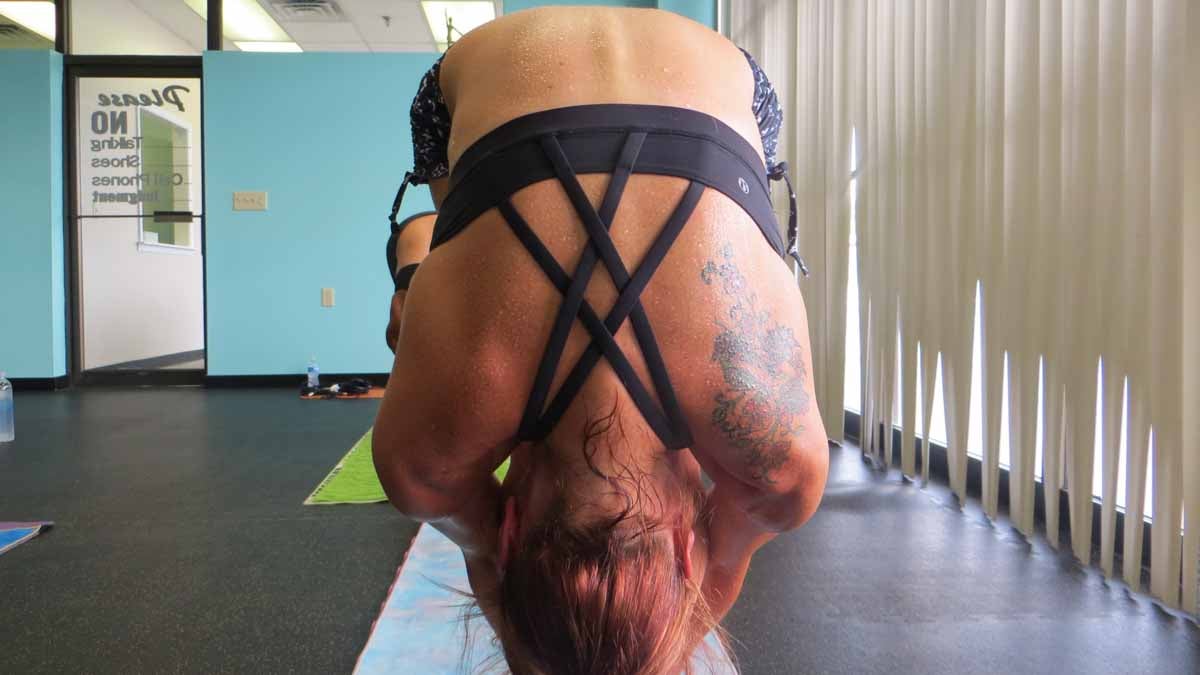Losing or keeping your cool: The science of why we sweat
Listen
What's the science behind why we sweat? (Taunya English/WHYY)
When temperatures rise, the body’s cooling mechanism kicks on.
At 105 Hot Yoga in Central Pennsylvania, people pay money to spend 90 minutes in a superhot room, working out next to a dozen-other, half-dressed people drenched in body fluid.
And, they love it.
Yoga studio owner Laura Markiewicz says modern people—with our air-conditioned cars and express elevators–don’t have a lot of built-in chances to exert ourselves.
“Back in the old days men would go out and work all day, and they’d come home soaking wet, provide for their families because they worked so hard,” Markiewicz said.
“So, it’s kind of like this manifestation of our hard work, right? That’s why we like sweat.”
That kind of sweat is all about thermoregulation. When your temperature creeps too far above 98.6 degrees, the body’s cooling mechanism kicks on. Sweat glands send perspiration to the surface of the skin, and heat comes with it. Then evaporation draws that heat away from the body, leaving a film of cooler sweat behind.
Perspiration is mostly water, plus a little salt and trace minerals.
It’s not really true that you can ‘sweat out’ toxins, but when people workout for a long time, the body uses up its supply of carbohydrates and begins to break down protein to make energy. In that process, the liver releases a waste chemical called urea that makes its way to our sweat. Urea is the same stuff that ends up in urine, and if you’re dehydrated–your sweat is more concentrated and can start to smell like urea—or ammonia.
Other than that, Markiewicz—who keeps the studio at a muggy 40 percent humidity and has lots of experience with sopping-wet yoga clothes—says fresh sweat is kind of ‘clean.’
“It doesn’t have a stink, a body odor,” she said.
The perspiration we hit the gym to cultivate comes from one type of sweat gland called eccrine glands. They’re located all over the body including the back of the knees, the forehead, even in your ears.
There’s a theory that our ability to sweat gives humans an evolutionary advantage. Imagine your ancestors hunting down antelope out on the African savanna. Sweat allowed them stay cool without having to stop, find shade, or pant like dog.
“We were able to actually run our prey down,” said Angela Ballard, a nurse-educator with the International Hyperhidrosis Society, a non-profit group for people who deal with uncontrollable, excessive sweat.
“Our endurance in the middle of the day when other animals have to rest maybe served us in getting our food,” Ballard said.
Without sweat the body can overheat, and that can damage internal organs, including the brain.
Other mammals do sweat, but humans are the most efficient. And despite the popular putdown ‘sweat like a pig,’ porkers don’t have many sweat glands; they roll in the mud to keep cool.
Stress sweat
There’s a second kind of perspiration that we talk about less.
“It’s thicker, it’s milkier, and it’s more of our flight or fight, or stress sweat,” nurse-educator Ballard said.
It’s the sweat that fuels a multi-billion dollar antiperspirant and deodorant industry.
Ballard says that kind of sweat comes from apocrine glands, which are clustered in hairy parts of the body. All sweat starts-out odorless. But when it’s trapped in our armpits—and groin area–it’s harder for perspiration to evaporate. When that moisture mixes with bacteria on the skin that can create a funk. But back when we were cave dwellers, body odor had a purpose.
“It may have helped warned our clan mates around us, that there was something to be scared of, you could smell fear,” Ballard said.
Embarrassment and anxiety, hormones and emotions activate apocrine glands.
Think back to the Republican primaries. Donald Trump suggested that Senator Marco Rubio’s sweatiness said something about his ability to lead.
“I do think there’s a cultural stereotype, there. When we see someone sweating, it means they are losing their cool–literally,” said Carisa Perry-Parrish, a psychologist who cares for patients at the Center for Sweat Disorders at Johns Hopkins Medicine in Baltimore.
She says physicians and nurses at Johns Hopkins began to notice high rates of depression and anxiety among people dealing with excessive sweat, so they invited her and other behavioral health experts to join the treating team.
“It’s an under-recognized problem,” said Perry-Parrish, who helps people work through the psychological burden, stigmatization and embarrassment.
Her patients have conditions that can require prescription medicine or even surgery just so they can get through the day.
“Like a police officer having a hard time holding on to her firearm because of hand sweating,” Perry-Parrish said.
She even has elementary-age clients. It’s tough when your classmates won’t hold hands to play Ring Around the Rosy because your hands are clammy, Perry-Parrish said.
It’s a feeling she really understood that last time she was at the farmer’s market in 100-degree weather.
“I had sweat rolling down my back, I was like, ‘Oh my gosh, this is so gross,'” she said. “Imagine feeling like that everyday, across every social interaction.”
While sweat-disorder clients have real issues to deal with, maybe the rest of us are little too freaked out about sweat.
Sweat is absolutely necessary and inevitable—even if you don’t plan on hunting down a gazelle today.
“It’s a shame we are so worried about it,” nurse-educator Angela Ballard said.
WHYY is your source for fact-based, in-depth journalism and information. As a nonprofit organization, we rely on financial support from readers like you. Please give today.



